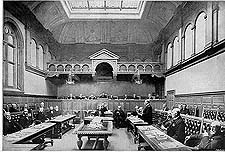

Proudly claimed by the Manx as the "oldest democratic parliament" - they celebrated its "Millennium" in 1979 though as Sir David Wilson points out the choice of dates was probably more connected with tourism than any accurate dating.
Originally an annual gathering of King , nobles and commoners at which fealty was pledged and laws enacted - still commemorated in Tynwald Day - it developed over the course of centuries to become today's elected House of Keys and ministers which meets in Douglas.
Originally held on Midsummer's day (25th June Old Style) which was Christianised into St. John's feast day; with the adoption of the new style calendar in 1753 the day was moved to the 5th July. The order of this ceremony was given in 1417 when the first Stanley King required that the laws of his newly acquired land be set down.
OUR doughtfull and gratious Lord, this is the Condition of old Time, the which we have given in our Days, how yee should be governed on your Tinwald Day. First, you shall come thither in your Royal Array, as a King ought to do, by the Prerogatives and Royalties of the Land of Man. And upon the Hill of Tynwald sitt in a Chaire covered with a Royall Cloath and Cushions, and your Visage into the East, and your Sword before you, holden with the Point upward; your Barrons in the third Degree sitting beside you, and your benificed Men and your Deemsters before you sitting; and your Clarke, your Knights, Esquires and Yeomen, about you in the third Degree; - and the worthiest Men in your Land to be called in before your Deemsters, if you will aske any Thing of them, and to hear the Government of your Land, and your Will; and the Commons to stand without the Circle of the Hill, with three Clearkes in their Surplises. And your Deemsters shall make Call in the Coroner of Glanfaba; and he shall call in all the Coroners of Man, and their Yards in their Hands,, with their Weapons upon them, either Sword or Axe. And the Moares, that is, to Witt of every Sheading. Then the Chief Coroner, that is the Coroner of Glanfaba, shall make Affence, upon Paine of Life and Lyme, that noe Man make any Disturbance or Stirr in the Time of Tinwald, or any Murmur or Rising in the King's Presence, upon Paine of Hanging and Drawing. And then shall let your Barrons and all other know you to be their King and Lord, and what Time you were here you received the Land as Heyre Apparent in your Father's Days. And all your Barrons of Man, with your worthiest Men and Commons, did you Faith and Fealtie. And in as much as you, are, by the Grace of God, now King and Lord of Man, yee will now that your Commons come unto you, and shew their Charters, how the hould of you. And your Barrons, that made no Faith nor Feaftie unto you, that they make now.
A brief history was given by J.R.Oliver - a later one by Kermode & Quine.
A photographic essay of 1900 shows the ceremony a century ago, since when it would have appeared to change little. An earlier description is in The Illustrated London News of 18 July 1857. George Head gives a much less flattering description of the St John's day scene of 1832 - possibly the 1900 ceremony had benefitted from the committee set up in 1888 & which still had to report in 1890 subsequent to what sounds like a badly organised ceremony.

Douglas Chamber (during Governor Henneiker's period
1895-1902)
The story of the movement of the House of Keys from the Parliament House, Castletown to Douglas during the 1860s/70s is told at some length by J Brown, initially to the Court House then at last to a purpose built building next door to the ex Bank of Mona building acquired for goverment offices.
|
|
||
|
|
||
|
Any comments, errors or omissions
gratefully received The
Editor |
||